Introduction
The Early Start Denver Model (ESDM) is an evidence-based intervention strategy designed to support young children with autism. This comprehensive approach focuses on fostering social, communication, and cognitive skills through engaging activities. By combining applied behavior analysis (ABA) techniques with developmental social-pragmatic models, ESDM creates a holistic learning environment for children with autism.
The model is backed by the National Academies of Sciences, Engineering, and Medicine, emphasizing the importance of evidence-based practices in promoting children's well-being. ESDM aligns with the inclusive approach advocated by the Individuals with Disabilities Education Act (IDEA), offering individualized and adaptable techniques that can be integrated into various early childhood programs. With its emphasis on parental involvement and flexible strategies, ESDM empowers parents and supports the unique talents and abilities of children with autism as they navigate inclusive environments.
What is ESDM Intervention?
The Early Start Denver Model (ESDM) is a evidence-based, comprehensive strategy specifically tailored for young children with autism. This play-based therapy focuses on fostering social, communication, and cognitive skills through engaging activities. It employs a blend of applied behavior analysis (ABA) techniques and developmental social-pragmatic models to create a holistic environment for learning and growth.
The ESDM approach is supported by a strong framework created by the National Academies of Sciences, Engineering, and Medicine, which highlights the significance of evidence-based practices in enhancing the welfare of individuals in their early years. This model is part of a growing recognition of the need for interventions that are not only effective but also feasible, acceptable, and sustainable within community settings and real-world applications. For example, the Incredible Years Teacher Classroom Management (IY-TCM) program, implemented in Portuguese schools, demonstrates the successful real-world application of evidence-based strategies, resulting in enhancements in youngsters' social and emotional abilities.
Furthermore, recent developments highlight the importance of inclusive early learning opportunities for individuals with disabilities. The Individuals with Disabilities Education Act (IDEA) and related initiatives promote the inclusion of individuals with autism into broader educational settings from early childhood. This approach aligns with the inclusive method by providing personalized and flexible intervention techniques that can be incorporated into different early childhood programs, thus endorsing the perspective that emphasizes the distinct abilities and talents of individuals with autism.
The collaborative effort between Emirates and Dubai International Airport to provide rehearsal flying experiences for individuals with neurodivergent conditions is a testament to the growing public awareness and dedication to accommodating the unique needs of individuals on the autism spectrum. Similarly, the ESDM framework provides a structured yet flexible approach to support the diverse learning styles and strengths of individuals with autism spectrum disorder, enabling them to thrive in inclusive environments both during their early years and as they transition into the wider world.
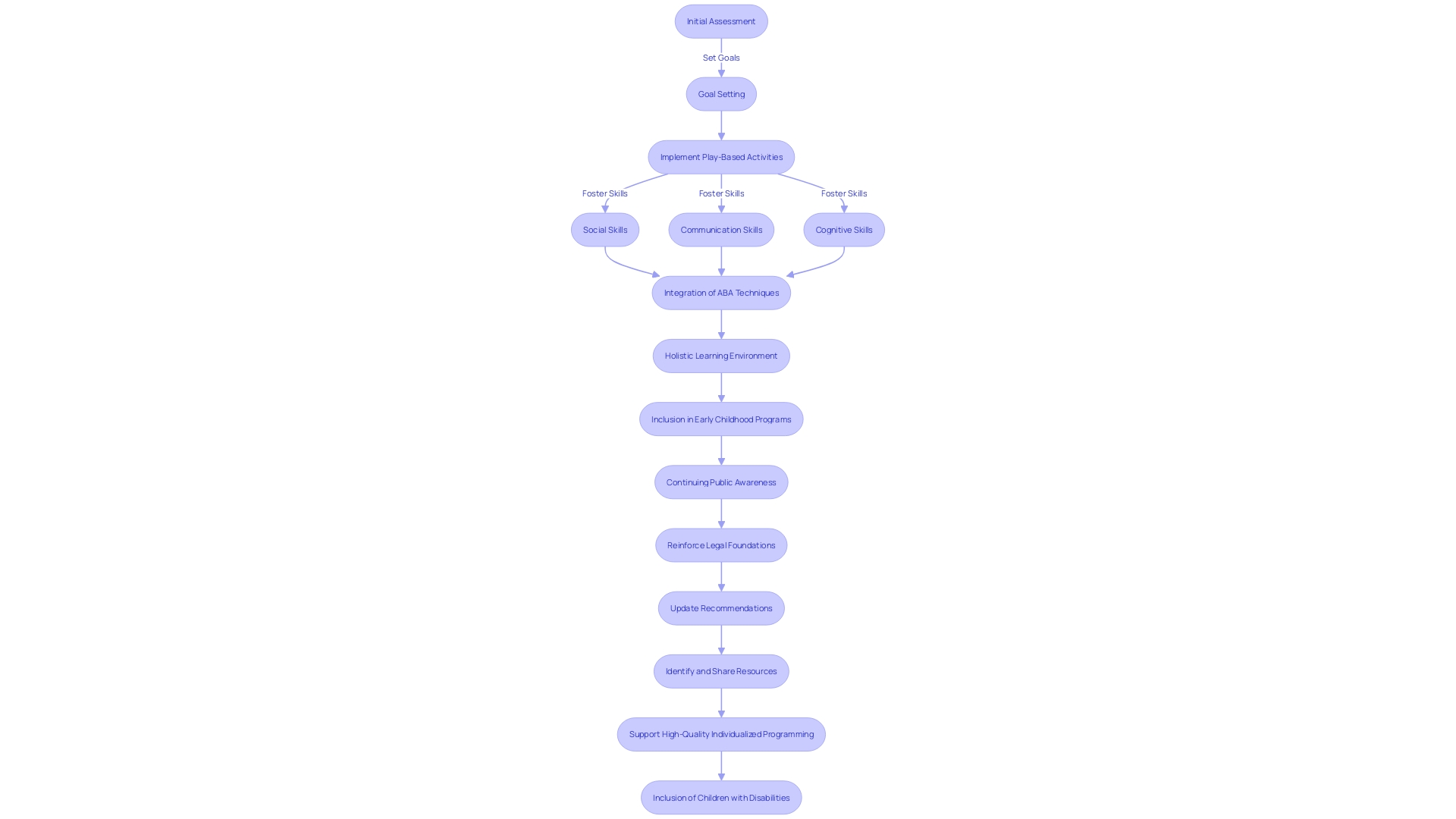
Key Principles and Components of ESDM
At the core of the Early Start Denver Model (ESDM) are fundamental principles that prioritize a child-focused approach to autism intervention. This model emphasizes the creation of a nurturing, engaging, and responsive learning atmosphere tailored to each individual's unique developmental stage. It emphasizes the significance of using naturalistic teaching approaches that seamlessly integrate into the young one's play and daily routines.
At the core of the Early Start Denver Model (ESDM) is the fostering of social consciousness and engagement, as early involvement in social settings is crucial for individuals with autism. Tailored treatment goals are set, ensuring that the actions are specifically aligned with each individual's requirements and capabilities. Additionally, the Early Start Denver Model acknowledges the invaluable role of parents, promoting their active participation in the intervention process, which not only enhances the child's development but also empowers the family as a whole.
The practical applications of Early Start Denver Model (ESDM) are diverse, ranging from play-based learning—where imagination and creativity lead the way—to structured opportunities for developing communication and language skills. Social skill enhancement is another crucial component, as it facilitates better integration with peers and adults alike. Cognitive abilities are nurtured through tailored training, while positive behavior reinforcement techniques are used to promote adaptive behaviors and reduce challenges.
In accordance with recent shifts in early childhood education, ESDM aligns with the broader goals of inclusivity, as outlined by the Individuals with Disabilities Education Act (IDEA). It supports the expectation that inclusion will continue as individuals with developmental disorder progress to elementary school and beyond. The model is congruent with ongoing efforts to enhance public understanding of neurodiversity and the science backing inclusive practices from the earliest years. The approach known as ESDM also reinforces the legal underpinnings that advocate for the integration of children with disabilities into early childhood programs.
As research methodologies in care for individuals with neurodevelopmental disorders develop, with a preference for randomized controlled trials over quasi-experimental studies, the evidence-based and well-regarded approach continues to be maintained. It stands as part of a diverse array of approaches aimed at supporting individuals with developmental disorder and their caretakers, amid a landscape where experts continue to explore and debate the most effective strategies for care and inclusion.
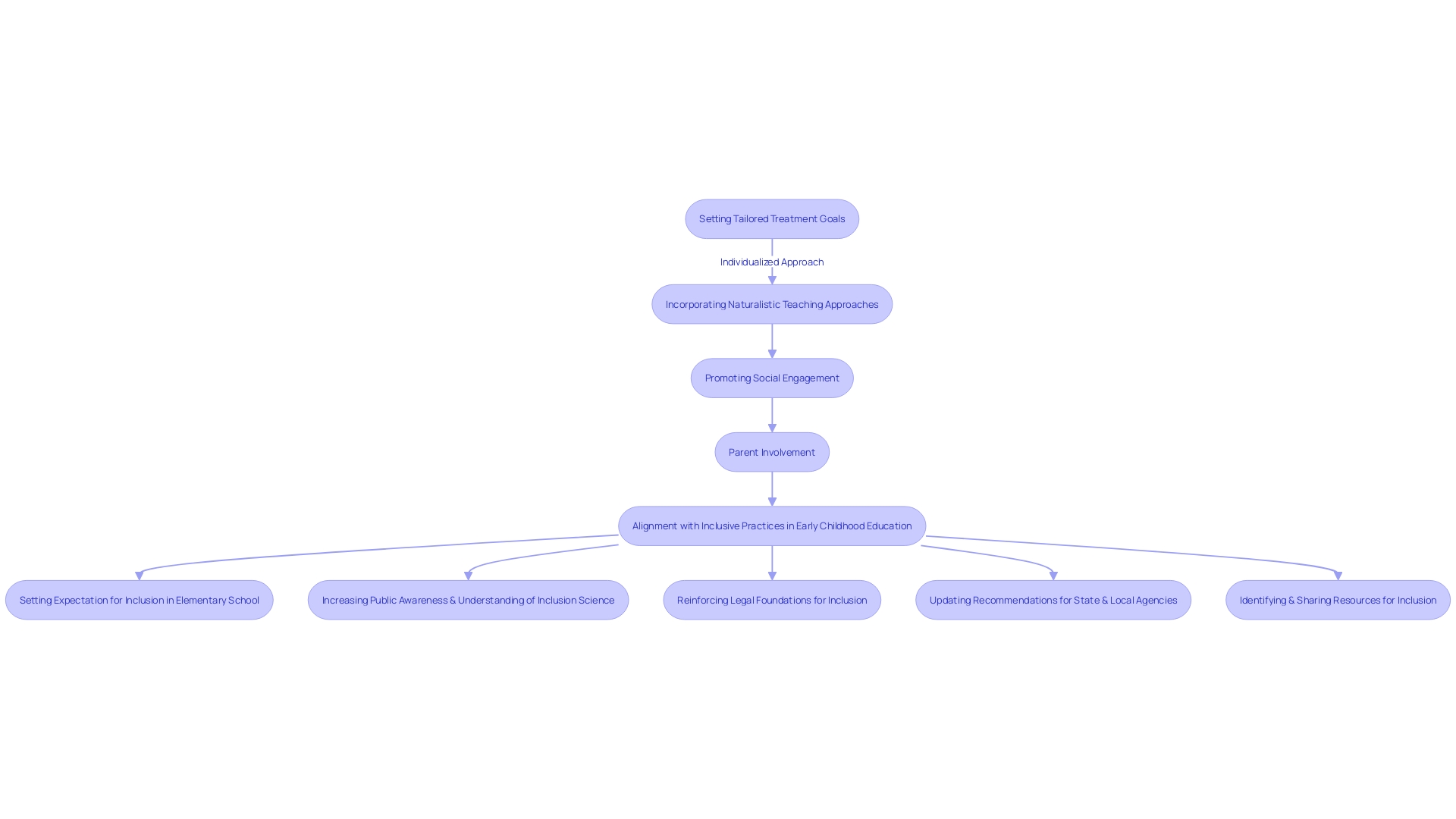
Research Evidence Supporting ESDM
The Early Start Denver Model is an innovative intervention approach that has been extensively studied and shown significant advantages for individuals with autism spectrum disorder (ASD). The evidence points to significant gains in core areas such as social communication, which is crucial for children with ASD as they navigate their early developmental stages. Cognitive abilities and adaptive behavior also see remarkable improvements, indicating that ESDM is a versatile approach, effective across various ages and levels of development.
Key implementation outcomes, as identified by experts, include factors like the acceptability of the approach, its feasibility, and the fidelity of its delivery. These outcomes are crucial for guaranteeing that the approach is not just effective in theory but also in practice, within real-world settings. The success stories from Portugal's nationwide effort, the Academias Gulbenkian do Conhecimento, stand testament to this, where actions like the Incredible Years Teacher Classroom Management (IY-TCM) program have been implemented with notable success, focusing on promoting social and emotional competencies in children.
Moreover, recent shifts in research approaches, from quasi-experimental studies to randomized controlled trials, have strengthened the credibility of ESDM and similar interventions. The federal advisory committee, the Interagency Autism Coordinating Committee (IACC), emphasizes the importance of coordinated efforts and the inclusion of diverse perspectives, including those of autistic individuals and their families, in advancing autism research and services.
The primary objective remains unchanged: to guarantee that all youngsters, especially those with disabilities, receive the assistance they require for their well-being and growth. This aligns with the poignant words of Dr. David (Dan) R. Offord, who highlighted the necessity for a fair and supportive environment for young individuals with disabilities, ensuring they receive equitable opportunities to thrive in all aspects of life.
Benefits of ESDM for Children with Autism
The Early Start Denver Model (ESDM) represents a symbol of advancement in the field of autism intervention. Based on a play-centered approach, the Early Start Denver Model (ESDM) goes beyond conventional therapy by covering a young individual's social, communication, and cognitive growth. This holistic strategy is not only appealing to the young minds it seeks to nurture but also plays a pivotal role in fostering meaningful parent-child connections. As children enjoy the engaging sessions, parents are equipped with the tools to become integral contributors to their offspring's developmental journey.
In accordance with the principles of Dr. David (Dan) R. Offord's vision for equal chances, the Early Start Denver Model (ESDM) corresponds to the philosophy of ensuring a just 'competition' for each individual, irrespective of their neurological condition. It encapsulates the essence of inclusion from early childhood, as emphasized by the Individuals with Disabilities Education Act (IDEA) and various early learning programs. By acknowledging the distinctive qualities and potential of each individual, the approach contributes to a reduction in chronic stress and supports caregivers in nurturing a thriving environment.
Recent changes in autism research emphasize the significance of evidence-based practices, such as randomized controlled trials. Such rigorous studies underscore the model's effectiveness and its alignment with the latest scientific advancements. Furthermore, EPIC Think Learn's neuroaffirmative technique using games and discussions aligns with the fundamental principles of early start Denver model, strengthening the importance of comprehending and utilizing a young individual's cognitive processes for their holistic health.
As educational and therapeutic paradigms evolve, the dissemination of resources and knowledge becomes critical. For children with disabilities, having access to exceptional, personalized programming is a fundamental entitlement, and the Early Start Denver Model (ESDM) stands as a brilliant instance of this principle in motion. Alongside groundbreaking interventions such as the Mental Health Intervention for Children with Epilepsy (MICE), the Early Start Denver Model (ESDM) opens doors for comprehensive and flexible support systems, customized to meet the varied needs of youngsters in different aspects of their lives.
How ESDM Differs from Traditional ABA Therapy
The Early Start Denver Model (ESDM) and conventional Applied Behavior Analysis (ABA) both aim to assist individuals with autism, yet they differ significantly in their approach. The approach is characterized by its playful, naturalistic methods that promote social interaction and communication skills. In contrast, traditional ABA often employs structured techniques to teach specific skills. 'ESDM also distinguishes itself by giving importance to engaging parents as active contributors in their offspring's growth, establishing a nurturing atmosphere in accordance with Dr. David (Dan) R. Offord's aspiration of equal opportunities for every youngster, encompassing those with impairments.'. This inclusive strategy aligns with the social model of disability, recognizing the importance of family and community assets in fostering mental health and equity. Significant progress has been made in the early detection of autism through recent technological advancements, like the AutMedAI model. This highlights the importance of timely and personalized interventions, such as ESDM, which target the specific challenges faced by children on the autism spectrum.
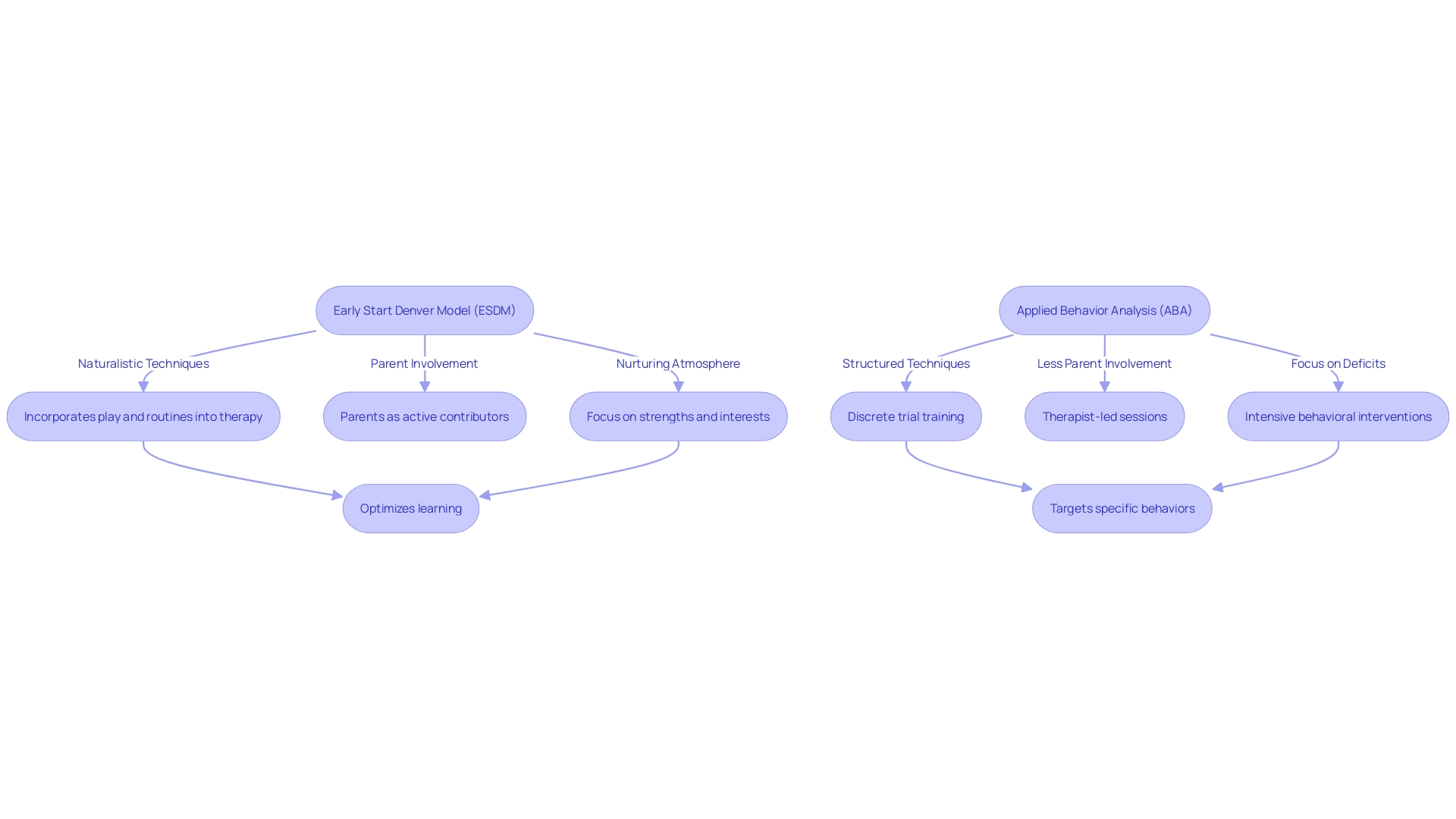
Implementing ESDM in Various Settings
The Early Start Denver Model (ESDM) is a flexible approach that can be customized to the specific requirements and situations of every individual with autism, as well as their family. Its adaptability allows for seamless integration into various environments, whether it's at home, in school, or within clinical settings. When implemented in a home setting, therapists actively involve themselves with the individual, concurrently empowering parents through focused advice and assistance. In the educational realm, ESDM fosters a collaborative synergy between therapists and teachers, ensuring that the individual receives a consistent learning experience. Clinical settings provide an organized environment for focused interventions, which may involve group therapy, strengthening the collaborative endeavor to promote the growth and inclusive engagement of young individuals. These efforts echo the commitment to uphold the legal foundations of inclusion, as mandated by the Individuals with Disabilities Education Act (IDEA), and the continuous drive to share resources and knowledge to facilitate high-quality, individualized programming for individuals with disabilities. Furthermore, initiatives like the collaboration between Emirates and Dubai International Airport, which create rehearsal flying experiences for neurodivergent children, exemplify the kind of societal inclusion and awareness that is critical for the integration of children with autism into various aspects of community life.
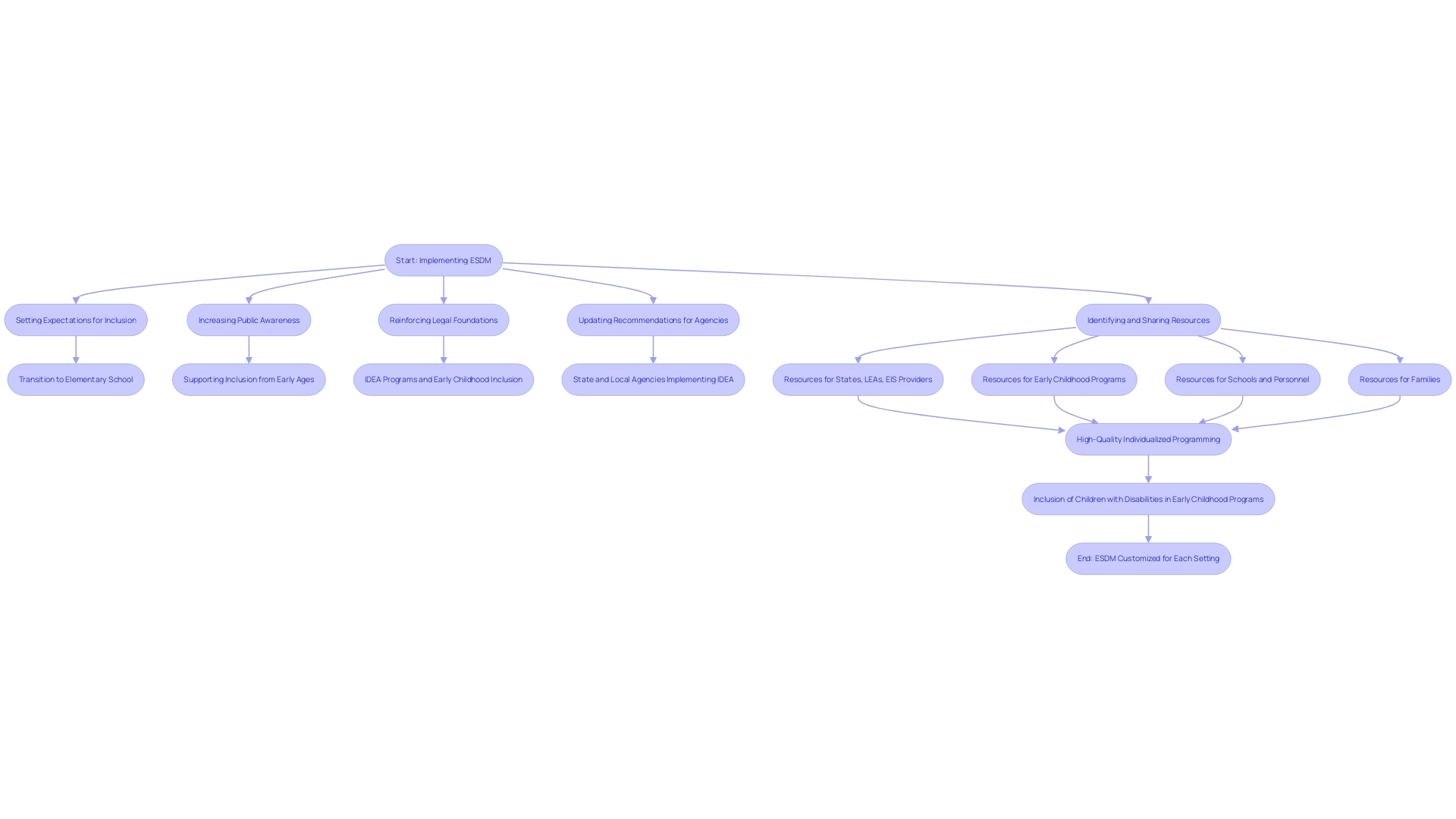
Training and Certification for ESDM Providers
Experts looking to implement Early Start Denver Model (ESDM) strategies should have the necessary training to ensure they can effectively deliver the program. The training covers a thorough comprehension of the theoretical foundations of early start Denver model, acquiring assessment techniques, and developing intervention strategies. Moreover, it emphasizes the importance of parental involvement, equipping professionals with tools to foster strong engagement with parents. The process of becoming certified is demanding, requiring coursework, supervised practical experience, and a comprehensive assessment of the professional's proficiency in applying the principles of ESDM.
Reflecting on the broader impact of such specialized training, we see the transformative effect it can have on healthcare delivery within communities. Take, for example, Aberash, a public health officer in Ethiopia, who underwent training on lymphoedema morbidity management and disability prevention. This training not only enhanced her capabilities but also allowed her to disseminate this knowledge to her colleagues, significantly improving patient care within her district. Similarly, the establishment of health care services that are capable of treating complex conditions like podoconiosis became possible due to focused training and knowledge sharing.
In the realm of public health, the significance of a well-trained workforce cannot be overstated, as evidenced by the efforts of Dr. Sudhir Bunga in South Sudan. There, gaps in the national health workforce were addressed by developing training and infrastructure to better respond to disease outbreaks. The success of these initiatives further highlights the crucial importance of training programs like those required for certification in electronic system design and manufacturing.
The importance of such educational initiatives is echoed by Medtronic, a global healthcare technology company that recognizes the power of knowledge and training to tackle health challenges. Their mission to alleviate pain, restore health, and extend life is carried out by a team passionate about delivering innovative healthcare solutions. Medtronic's dedication to promoting data-driven care through education and technology is in line with the objectives of training programs to ensure healthcare professionals are well-prepared to have a positive impact on the lives of those they serve.
Moreover, the broader implications of specialized training programs extend to the legal and advocacy realms. Training reinforces the legal foundations supporting inclusion in early childhood, as well as updates recommendations for state and local agencies to increase inclusive early learning opportunities. It also plays a pivotal role in sharing resources to support high-quality individualized programming and the inclusion of young individuals with disabilities in early childhood programs.
In summary, receiving training for the intervention that focuses on early social communication and language skills is not only about getting certified; it serves as a pathway to improving community health outcomes, reinforcing legal and advocacy initiatives, and ultimately raising the quality of care for individuals with special needs, including those affected by autism.
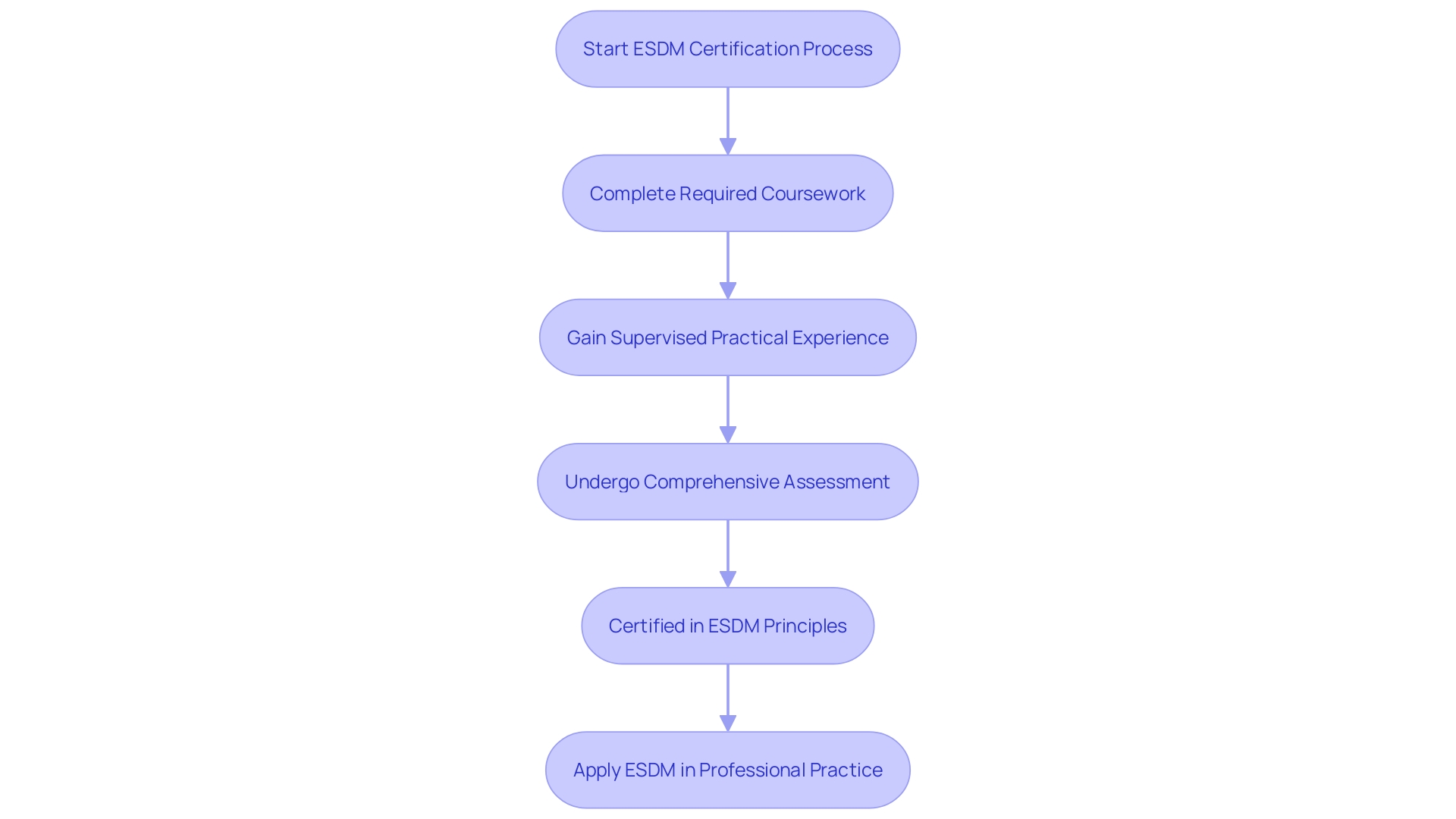
Parental Involvement in ESDM Therapy
The participation of parents in Early Start Denver Model (ESDM) therapy is crucial for the developmental progress of children diagnosed with autism. In this parent-involved approach, caregivers are not just observers, but they become integral to the therapeutic process. With expert guidance from therapists specialized in Early Start Denver Model (ESDM), parents acquire practical techniques that improve their offspring's education in different environments—whether it is during formal sessions or in day-to-day interactions within the family.
Parents are equipped with the tools to extend the benefits of professional therapy into the home environment, reinforcing skills and promoting generalization to different contexts. This not only contributes to the youngster's capacity to apply new skills in diverse situations but also reinforces the emotional connection between parent and youngster, creating a nurturing atmosphere conducive to growth. The principle of inclusivity and assistance emphasized in the program aligns with the wider objectives of guaranteeing fairness in opportunities for youngsters with disabilities, as promoted by specialists such as Dr. David (Dan) R. Offord.
As research evolves, the ESDM's person-centered approach remains in step with the latest science advocating for early inclusion. It emphasizes the legal and ethical requirements to deliver top-notch, personalized programming that promotes the integration of individuals with disabilities in early childhood programs. By continually updating resources and recommendations for agencies and families, the commitment to fostering an inclusive and supportive environment for every individual to thrive is reaffirmed, mirroring the philosophy of programs like EPIC Think Learn, which tailors support to the unique journey of each person.
With initiatives that increase public awareness and understanding, such as Dubai International Airport's collaborative efforts to ease travel experiences for individuals with disabilities, the importance of integrating children with special needs into every aspect of daily life gains traction. Such inclusive practices are instrumental in 'making the race fair,' ensuring that every individual, regardless of ability, can participate meaningfully in their community.

Measuring the Effectiveness of ESDM
To ascertain the success of Early Start Denver Model (ESDM) interventions, a variety of assessment tools are employed. These tools are designed to measure progress in key developmental areas, including social communication, cognitive abilities, adaptive behaviors, and general developmental advancements. Tracking this progress through consistent and methodical assessments is vital for adapting treatment plans effectively and making informed decisions that will benefit the individual's growth.
Dr. David (Dan) R. Offord's statement that all individuals, especially those with disabilities, should have the chance to fully and fairly engage in society emphasizes the significance of such thorough evaluations. He emphasizes the need for society to ensure a 'fair race' for children, which includes providing the necessary support for children with a developmental disorder to thrive.
Recent shifts in autism research methodologies from quasi-experimental studies to more rigorous randomized controlled trials highlight the importance of such robust assessment measures. The Interagency Autism Coordinating Committee (IACC) also suggests ongoing enhancement of evidence-based approaches and training for educators to successfully implement and assess them.
Professors Talbott and De Los Reyes's team-based collaborative care model (TBCCM) emphasizes the importance of incorporating diverse data sources, including input from parents, teachers, and the children themselves, in the assessment process. This cooperative strategy coincides with the IACC's focus on communication and collaboration across various fields to improve the quality and effectiveness of interventions for individuals with autism.
In conclusion, continuous and thorough evaluation, guided by the most recent research and collaborative models, is crucial to improving ESDM interventions and guaranteeing that they meet the distinctive needs of every individual with autism. By doing so, we can strive towards a society where every child, regardless of their abilities, has the opportunity to develop to their fullest potential.
Conclusion
In conclusion, the Early Start Denver Model (ESDM) is an evidence-based intervention strategy that supports young children with autism. It combines applied behavior analysis (ABA) techniques with developmental social-pragmatic models to foster social, communication, and cognitive skills. ESDM aligns with the inclusive approach advocated by the Individuals with Disabilities Education Act (IDEA), offering adaptable techniques that can be integrated into various early childhood programs.
Research evidence supports the effectiveness of ESDM in improving social communication, cognitive abilities, and adaptive behavior. The model's success is reinforced by its alignment with the latest scientific advancements and the inclusion of diverse perspectives in autism research and services.
ESDM distinguishes itself from traditional ABA therapy by emphasizing playful and naturalistic methods that encourage social interaction and communication skills. It also recognizes the importance of parental involvement, creating a supportive environment that nurtures both the child's development and the family as a whole.
ESDM's versatility allows for implementation in various settings, including the home, school, and clinical environments. By empowering therapists and teachers to collaborate and involving parents as active participants, ESDM ensures a consistent and comprehensive learning experience for the child.
Specialized training and certification are essential for professionals implementing ESDM interventions. This training enhances their competence in applying ESDM principles and has broader implications for community health outcomes, legal and advocacy efforts, and the standard of care for individuals with special needs.
Active parental involvement is pivotal for the success of ESDM therapy. By equipping parents with strategies and extending the benefits of therapy into the home environment, ESDM promotes skill generalization and strengthens the emotional connection between parent and child.
In conclusion, the Early Start Denver Model (ESDM) provides an evidence-based, comprehensive approach to supporting children with autism. With its emphasis on parental involvement, adaptability, and inclusivity, ESDM empowers parents and supports the unique talents and abilities of children with autism. Implementing ESDM creates a nurturing and supportive environment where every child has the opportunity to thrive.




